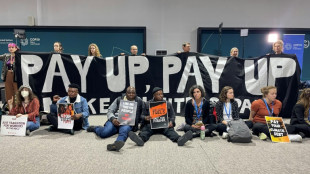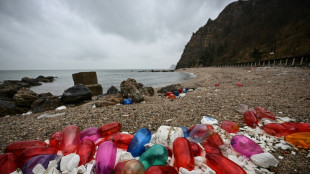
-
 Netanyahu threatens 'intensive war' if Hezbollah breaches fragile truce
Netanyahu threatens 'intensive war' if Hezbollah breaches fragile truce
-
Bilbao join Lazio at Europa League summit, Chelsea cruise in Conference League

-
 In Lebanon's Tyre returning residents find no water, little power
In Lebanon's Tyre returning residents find no water, little power
-
Protests in Georgia after PM delays EU bid to 2028

-
 Biden slams Trump tariff threats as 'counterproductive'
Biden slams Trump tariff threats as 'counterproductive'
-
TikTok tactics shake up politics in Romania

-
 'He should do comedy' says Norris of Verstappen comments
'He should do comedy' says Norris of Verstappen comments
-
Americans celebrate Thanksgiving after bitter election

-
 Flood-hit Spain introduces 'climate leave' for workers
Flood-hit Spain introduces 'climate leave' for workers
-
UK's Starmer vows to slash net migration

-
 Recount order, TikTok claims throw Romania election into chaos
Recount order, TikTok claims throw Romania election into chaos
-
Jansen stars for South Africa as Sri Lanka crumble to 42 all out

-
 Bottas set for Mercedes return as Mick Schumacher quits reserve role
Bottas set for Mercedes return as Mick Schumacher quits reserve role
-
Putin threatens Kyiv with new hypersonic missile

-
 Georgia delays EU bid until 2028 amid post-election crisis
Georgia delays EU bid until 2028 amid post-election crisis
-
French PM announces concession in bid to end budget standoff

-
 Guardiola's ingenuity will solve Man City crisis, says Slot
Guardiola's ingenuity will solve Man City crisis, says Slot
-
South Africa in control after Sri Lanka crash to 42 all out

-
 'Nothing left': Flood-hit Spanish town struggles one month on
'Nothing left': Flood-hit Spanish town struggles one month on
-
Israel conducts first strike on Lebanon since ceasefire

-
 'Unrecognisable' Mbappe and Real Madrid hurting after European woes
'Unrecognisable' Mbappe and Real Madrid hurting after European woes
-
Uber and Bolt unveil women-only service in Paris

-
 French cognac workers protest China bottling plan amid tariff threat
French cognac workers protest China bottling plan amid tariff threat
-
World tennis No.2 Swiatek accepts one-month doping suspension

-
 Suaalii to start for Wallabies against Ireland
Suaalii to start for Wallabies against Ireland
-
Farrell backs youngster Prendergast at fly-half for Aussie Test

-
 Suualii to start for Wallabies against Ireland
Suualii to start for Wallabies against Ireland
-
Camavinga joins Real Madrid injury list

-
 Australia passes landmark social media ban for under 16s
Australia passes landmark social media ban for under 16s
-
Nigerian president woos French investment on state visit

-
 Contentious COP29 deal casts doubt over climate plans
Contentious COP29 deal casts doubt over climate plans
-
PSG, Real Madrid toil as giants struggle to get to grips with new Champions League

-
 Lampard appointed manager of 'ambitious' Coventry
Lampard appointed manager of 'ambitious' Coventry
-
Liberian ex-warlord Prince Johnson dies aged 72

-
 K-pop band NewJeans leaves label over 'mistreatment'
K-pop band NewJeans leaves label over 'mistreatment'
-
Sri Lanka crash to record low Test total of 42 in South Africa

-
 Putin says barrage 'response' to West-supplied missiles
Putin says barrage 'response' to West-supplied missiles
-
Lebanon MPs seek end to leadership vacuum with January presidency vote

-
 Eurozone stocks lift as French political stand-off eases
Eurozone stocks lift as French political stand-off eases
-
French farmers wall off public buildings in protest over regulations

-
 France says ready for budget concessions to avert 'storm'
France says ready for budget concessions to avert 'storm'
-
Lampard appointed Coventry manager

-
 French luxury mogul Arnault defiant at ex-spy chief trial
French luxury mogul Arnault defiant at ex-spy chief trial
-
South Africa bowled out for 191 against Sri Lanka

-
 'Europe's best' Liverpool aim to pile pain on Man City
'Europe's best' Liverpool aim to pile pain on Man City
-
Hezbollah under pressure after war with Israel

-
 OPEC+ postpones meeting on oil output to December 5
OPEC+ postpones meeting on oil output to December 5
-
Zelensky slams Russia's 'despicable' use of cluster munitions in energy strikes

-
 One dead, thousands displaced as floods hit southern Thailand
One dead, thousands displaced as floods hit southern Thailand
-
Lebanon army deploys under Israel-Hezbollah ceasefire


US top court backs Big Tech over terror claims
The US Supreme Court handed a victory to Twitter and Google on Thursday, saying the social media giants could not be held liable by victims of terrorist attacks for posts that endorsed the Islamic State group.
Crucially, the cases that targeted Google-owned YouTube and Twitter were seen as potential challenges to decades-old legal protections for tech companies.
The justices declined to wade into the debate, indicating that the cases fall outside the scope of the law because the platforms did not in any case "aid and abet" IS terror attacks by hosting postings supportive of the extremist group.
A law known as Section 230 gives internet platforms blanket immunity from any legal fallout of content that comes from a third party, even if it is pushed out as a recommendation by the website.
Section 230, which became law in 1996, is credited with allowing the no-holds-barred expansion of the internet but has increasingly been seen as helping cause the harmful effects of social media on society.
Without it, websites would potentially be open to lawsuits for content posted by users, making the free-wheeling discussions seen on social media subject to much stricter moderation.
A bitterly divided US Congress has failed to update the rules, and many US states are passing their own laws to make platforms such as Facebook, Instagram and TikTok more responsible for content.
"Enough is enough... Congress must step in, reform Section 230, and remove platforms' blanket immunity from liability," said influential Democratic Senator Dick Durbin after the ruling.
- 'Decline to address' -
The justices of the Supreme Court largely evaded the question. They said that the allegations against YouTube and Twitter did not amount to a liable infraction and therefore the debate over section 230 was not pertinent.
"We therefore decline to address the application of Section 230 (in a case) that appears to state little, if any, plausible claim for relief," they said.
The justices however gave no indication on how they could potentially address the immunity issue in the future, nor were their stances on the matter made clear at hearings in February.
Google welcomed the result.
"Countless companies, scholars, content creators and civil society organizations who joined with us in this case will be reassured by this result," said Halimah DeLaine Prado, Google’s general counsel.
An association representing US tech companies said the decision was good news.
"The Court correctly recognized the narrow posture of these cases and declined to rewrite a key tenet of US Internet law, preserving free expression online and a thriving digital economy," said Matt Schruers, head of the Computer & Communications Industry Association.
- 'Fight another day' -
The first of the two cases involved a US victim of the 2015 Paris attacks, claimed by the IS group.
The other case was brought by the family of a victim of a 2017 attack by the group on an Istanbul nightclub.
The family alleged that Twitter's failure to take down and stop recommending IS tweets constituted aiding an act of terror.
The Supreme Court declines to hear the vast majority of the cases that come its way, and experts had predicted that by opting to decide on this one justices could be willing to modify the increasingly contested landmark law.
But in the hearings, the justices largely expressed doubts that the case would be fit to begin a debate about reworking Section 230.
J.Bergmann--BTB


